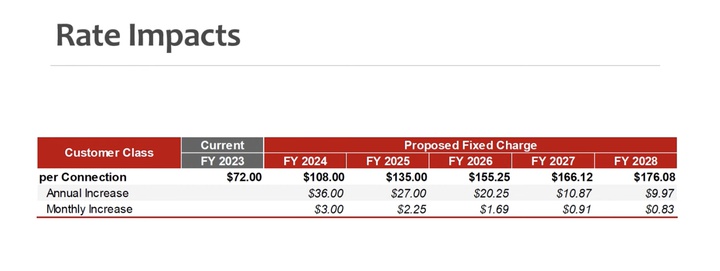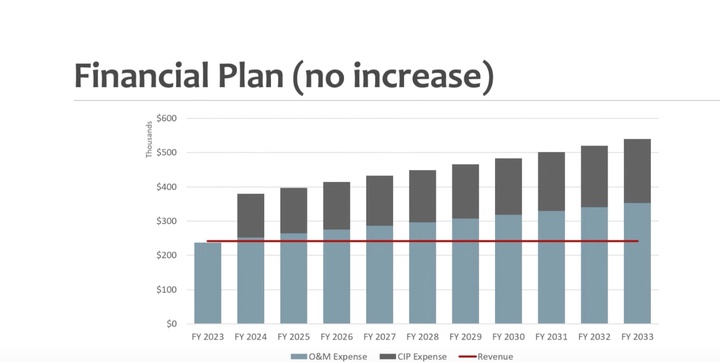Jessica Cejnar Andrews / Wednesday, June 28, 2023 @ 3:24 p.m.
Del Norte Supervisors Approve Sewer Rate Increase Despite Allegations That The Public Wasn't Given Enough Notice
Today's meeting
Previously:
###
Though one of their colleagues called for a do-over in the Proposition 218 process, three Del Norte County supervisors approved a sewer rate increase that would impact 2,210 properties outside Crescent City limits.
Supervisors Darrin Short, Valerie Starkey and Joey Borges said Wednesday that they were satisfied that residents living within the County Service Area received sufficient information stating that the rate increase would show up on their property taxes, not their monthly sewer bill.
The county received 189 letters from affected property owners protesting the rate increase under Proposition 218, County Clerk-Recorder Alissia Northrup told supervisors. That was a raw count, she said, but for the rate increased to be overturned, the county needed to have received about 1,106 protest letters — or 50 percent plus one.
“We’re not close,” Northrup said.
Northrup also addressed accusations from Linda Sutter and Donna Westfall, members of the Crescent City and Del Norte County Taxpayers Association, who said the lists they received from the county of affected property owners were outdated.
“As far as redoing this (process), if we send notices out to the same addresses, those addresses aren’t going to be different. Those addresses are only updated through the assessor’s office," Northrup said.
Still, District 5 Supervisor Dean Wilson asked his colleagues to start the Proposition 218 process over again, pointing out there was enough confusion for people to call him and his colleagues for clarification.
“It’s our duty and our responsibility to make sure our communications are clear,” he said. “Obviously they weren’t, otherwise we wouldn’t have had 100 calls. We wouldn’t have had to talk to people in restaurants or on the street or in the store and (via) personal phone calls.”
Though he said he understood the need for a rate increase, Wilson dissented.
District 3 Supervisor Chris Howard was absent.
The five-year rate increase is necessary to avoid a deficit in the CSA’s operating and maintenance budget, County Engineer Jon Olson told supervisors. County engineering staff also aim to build a reserve for capital improvement projects, he said.
The new rates will take effect July 1 with property owners seeing them on their property tax bills, Olson said. The increase will impact property owners in two assessment districts, one within the Bertsch-Ocean View area southeast of Crescent City and the other in the unincorporated area just north of the city.
Property owners in one district pay $72 annually for their county sewer fees, while the others pay $78 annually, said Zachary Van Dinther, an economist with the Santa Barbara-based firm, RDN Inc., who put together first rate study for the system since user fees were set in the 1980s.
“We’re just breaking even in fiscal year 2023,” Van Dinther told supervisors, adding that at the current rate, revenue stays consistent at about $240,000 over 10 years while operating and maintenance costs increase. “But, as you can see the rising operating costs quickly lead us to a deficit in the outer years. Not to mention all CIP needs are in excess of the revenues. Without any adjustments we will not be able to properly maintain the system and continue the high quality of service.”

This table shows the annual increases ratepayers on the county's sewer system in CSA-1 can expect on their property tax bills. | Screenshot
Starting from the current $72 rate, property owners would pay $108 annually in fiscal year 2024; $135 in fiscal year 2025; $155.25 in fiscal year 2026; $166.12 in fiscal year 2027; and, finally, $176.08 per year by 2028.
The rates the county charges are different than the monthly sewer bill Crescent City sends ratepayers. According to Olson, those dollars pay for the pipes, pumps and other equipment outside city limits. Del Norte County has a long-standing contract with Crescent City to maintain the system, he said.
“The city collects money for the sewer system inside city limits for the maintenance of pipes and also the operation and maintenance of the wastewater treatment plant,” Olson told the Wild Rivers Outpost. “If you live inside the county, you pay your monthly sewer bill, which is paying your portion of the city collection system and the operation and maintenance of the wastewater treatment plant.”
During Van Dinther’s presentation, Starkey pointed out that based on his information, the annual rate CSA property owners pay for their sewer breaks down to about $6.50 per month cumulatively. At the end of five years, though the overall increase is 245 percent, that monthly cumulative cost for ratepayers will jump to $14.66, Starkey said.
Van Dinther confirmed Starkey’s assessment, saying the recommended rate increases can be adjusted lower.
“If the operating costs are less than budgeted for in any given year or revenues are higher or the system is running flawlessly, these revenue adjustments can be anything lower,” he said. “But this is the absolute ceiling.”
A few weeks after the Board of Supervisors decided to increase sewer rates, the county’s system experienced an emergency that could have been costlier than the $30,000-40,000 Olson said is the current cost estimate.
A barrier between a wet well and a dry well that contain pumps and other equipment near Pacific Avenue and Inyo Street was breached causing the dry well to flood, Olson said. The county was able to salvage that equipment, however, and get them back into service.
“We didn’t lose functionality in (people's) homes,” Olson said, adding that the county is still waiting on the city’s bill for the work it did in preventing a sewer overflow and performing those repairs. “Some bypass pumping interrupted folks’ driveways and trash collection, but we worked with individual homeowners and the trash collection company to facilitate their needs.”
According to Olson, county staff had been diligent about pursuing grant funding for other projects, such as a generator project to ensure the lift stations in the system are operating during a power failure.
“But even that amount of money is insufficient to cover all 15 lift stations,” he said. “There are a number of smaller work orders with the building department for roofs, siding repairs and basic maintenance that is ongoing to protect the existing assets we have.”

An economist says operating and maintenance costs will outpace the sewer system's revenues in future years. | Screenshot
The handful of people who spoke during public comment were opposed to the rate increases. Most balked at being given only 45 days to protest either by mailing a written statement to the county or by dropping it off.
Aaron Skroback, who lives in District 4, said he opposed his sewer rates increasing by more than double on his property taxes over the next five years. He pointed out that while operating and maintenance costs are increasing, wages stay the same.
“Already I’m paying $63.14 a month for septic and $78 a year on my property taxes for a total of $835 a year,” Skroback said, holding up his monthly sewer bill. “After the increase from $78 to $176.08, septic will be $934 a year. It will take a person making $30 an hour working 40 hours a week to pay this after taxes and $30 an hour is a decent wage for around here.”
Skroback also pointed out that the county asks people to go through a lot of time and effort to oppose the rate increase.
“If we don’t want our taxes raised, we had to write a statement of opposition with our personal number and name and mail it or deliver it in person to the county clerk in less than two months from the time we received the notice letter,” he said. “If not enough people go through those steps, in three days, on July 1 it goes into effect. The Board is banking on not enough people responding in the short time to get this shoved through.”
Greg Bianchi, an eight-year resident of Del Norte, said it isn’t fair he and other residents only get three minutes to speak on an issue that, if approved, will impact them for years. He said if he had known what he’d have to pay to live in Del Norte, he’d have chosen another place to live.
“You guys have been chosen by the people here in this community to sit in those chairs and pass decisions that are critical to our lifestyle and living here,” Bianchi said. “I wish you guys would get off your keisters and think about who you represent. Who you work for.”
Though one resident, Sam Strait, asked about the possibility of using Measure R dollars to meet the needs of the county’s sewer system, County Counsel Joel Campbell-Blair said that would be a loan of public funds that would require a four-fifths vote of the Board of Supervisors.
The County Service Area is a legally distinct government entity separate from the county, though county supervisors make policy decisions, he said.
CLICK TO MANAGE